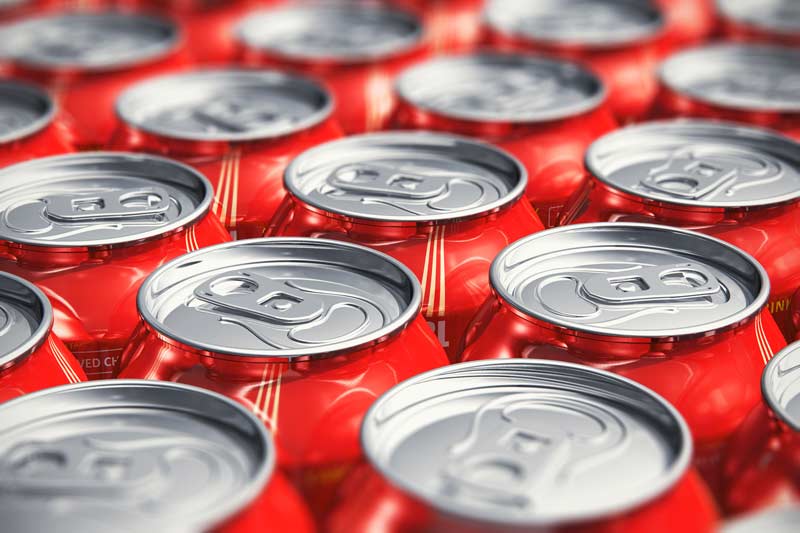
What are sugar free drinks?
Beverages like soda, energy drinks, and sports drinks, are often packed to the brim with added sugar, so any sugar free alternative is automatically healthier…right?
Well yes. Anything is going to beat downing down liquid sugar.
However, whether a sugar free option is healthier or not also depends on what the regular sugar has been replaced with. Sugar free drinks contain a wide variety of sugar substitutes, from harmless, natural sweeteners to toxic artificial sugars that you want to steer clear of!
Regular sodas and energy drinks can be sweetened with cane sugar (sucrose) or high fructose corn syrup, or a combination of both.
Sugar free drinks may contain a man-made artificial sweetener like saccharin, sucralose, acesulfame potassium (known as “ace-k”) or aspartame.
Early on, these fake sugars were celebrated as great alternatives for diabetics because they contain zero calories and they are said not to raise blood sugar levels.
Unfortunately, research has found that some of these ‘artificial’ alternatives may cause a range of side effects including weight gain and an increased risk for metabolic syndrome and heart disease.
Because of these potential side effects, many people opt for more natural sweeteners like stevia, xylitol, tagatose, and monk fruit. These sweeteners are low in calories, easy on your blood sugar, and they rarely have side effects.
Nutrition facts for sugar free drinks
As a person with diabetes or prediabetes, counting carbohydrates should be a top priority when it comes to nutrition.
Getting the proper vitamins and minerals from whole foods is also important, but limiting the number of carbs you consume will directly affect your blood sugar more than any other dietary habit.
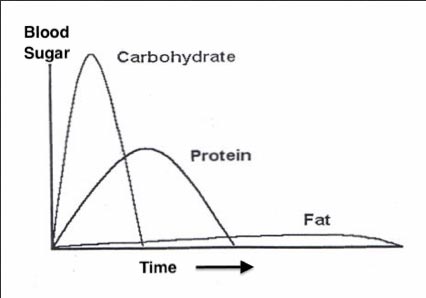
By reducing your intake of carbs and simple sugars you may be able to lower your A1C level and your fasting blood glucose levels, plus you’ll feel more physically and emotionally stable throughout the day.
Drinking plain water day after day can get boring and you may be tempted to reach for a soda, a Gatorade, or an energy drink.
But before you take a sip, consider the amount of carbs in that bottle!
If you’re sipping on a regular Monster energy drink or a regular Coke then you’ll be downing close to 40 grams of carbs per serving (watch out – those blood sugar levels will be soaring!)
Luckily, there are sugar free versions of many beverages on the market today, and they definitely are far superior to their sugar-filled counterparts.
Consider this nutrition facts label for a Monster Absolutely Zero energy drink.
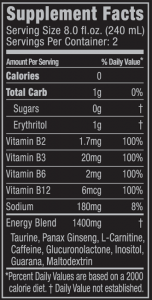
This drink only contains 1 gram of carbs per serving!
How is this possible?
In this case, the company swapped out cane sugar and high fructose corn syrup for a sugar alcohol called erythritol.
Sugar alcohols taste sweet but they don’t raise your blood sugar the way regular sugar does, plus they are completely free of calories.
Some people experience digestive distress from sugar alcohols, however, and those folks should stick to natural plant-based sweeteners like stevia, which has virtually no known side effects.
Comparing regular vs. sugar free beverages
Regular sodas and sports drinks are extremely high in sugar and should be avoided at all costs!
Take a look at this comparison chart and notice the differences in sugar between the regular drinks and the sugar free alternatives.
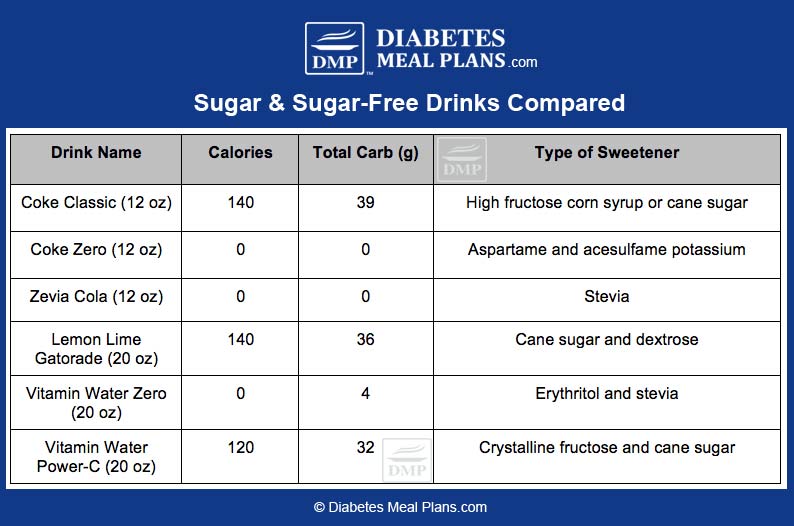
You can see that the traditional sports drinks and sodas contain between 32 and 39 grams of carbs while the sugar free alternatives contain zero grams, or close to it.
The amount of straight sugar found in these so-called “healthy” sports drinks is also a bit shocking, and this is why it is so important to ignore the flashy health claims and examine the nutrition facts for yourself.
Ice tea and juices are also major sugar-traps that many health conscious people fall into.
Most of the ice tea you find in restaurants or in stores will be sweetened with added sugar unless it is specifically labeled as “unsweetened.”
Even fruit and vegetable juice can contain loads of sugar, so always check the label before you buy! Eating whole fruits and vegetables gives you more fiber, less sugar, and leaves you feeling more satisfied than drinking juice will.
Long story short, the type of beverages you choose to consume have a huge impact on your health, so choose wisely.
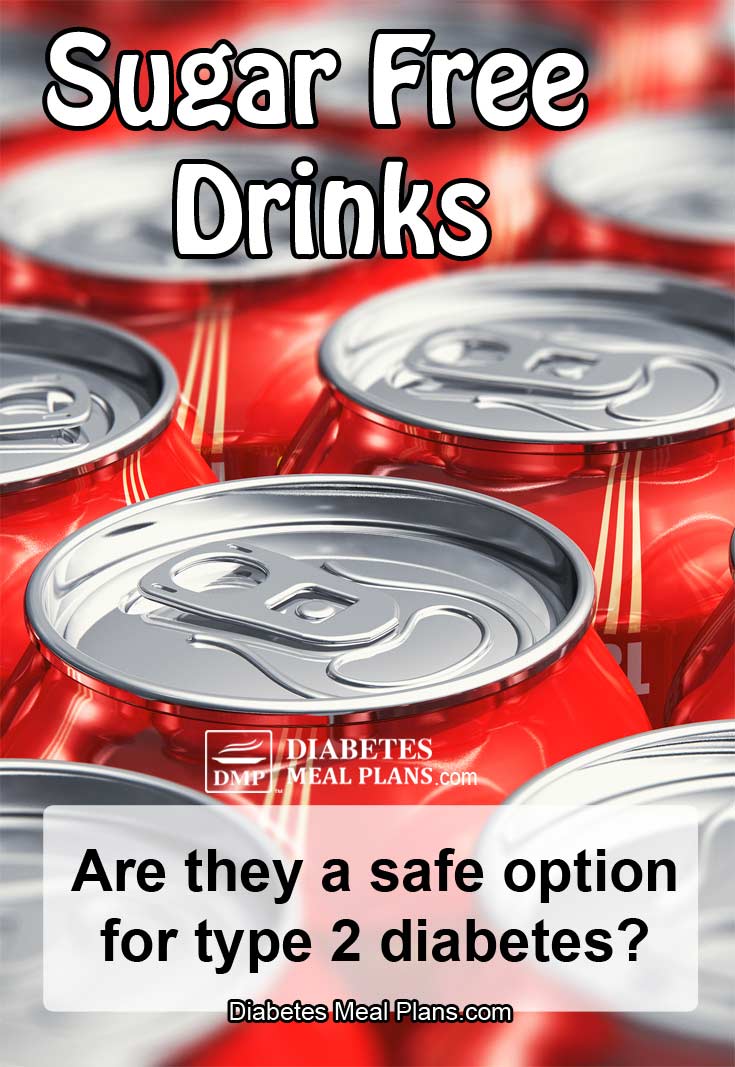
Research on sugar free drinks and diabetes
Sweeteners have such an impact on our health that there have been many scientific studies on their effects.
Here are a few of those studies…
Some studies have found a dose dependent relationship between high fructose corn syrup intake and a person’s risks for cardiovascular disease. This means that the more you consume beverages filled with high fructose corn syrup, the greater your risk for heart disease will be.
And if that wasn’t enough, high fructose corn syrup has also been associated with increased rates of type 2 diabetes and obesity as well as higher levels of triglycerides in the blood, which may contribute to fatty liver disease.
But high fructose corn syrup isn’t the only type of sweetener that diabetics need to look out for.
Studies have actually found that people with impaired glucose tolerance respond to high-carb sweeteners like honey and sucrose (cane sugar) in the same way as they respond to high fructose corn syrup.
For example, a two week study had glucose-intolerant participants consume 50 grams of carbohydrates from sucrose, honey, or high fructose corn syrup on a daily basis to see what the effects would be.
Regardless of which sweetener was consumed, the participants with glucose intolerance all experienced an increase in inflammation (C-reactive protein), an increase in triglyceride levels, and an increase in levels of blood glucose and insulin by the end of the two weeks.
They also had higher insulin resistance and poorer scores on the oral glucose tolerance test than they did before the daily exposure to high carb sweeteners.
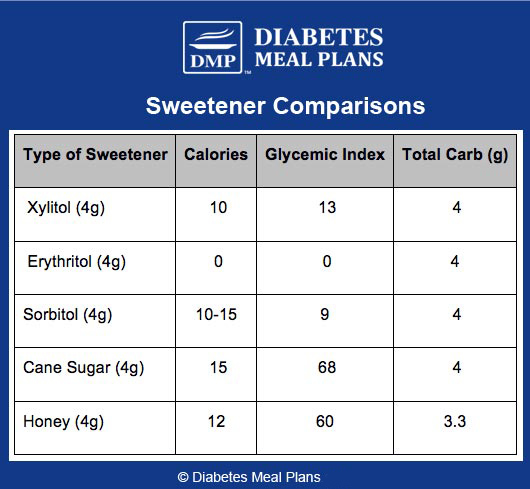
Simple sugars like cane sugar, dextrose, and the dreaded high fructose corn syrup found in soft drinks can cause massive spikes in your blood sugar, which is why we recommend a low carb diet that is free of most sugars.
However, consuming low carb artificial sweeteners like aspartame, sucralose, and saccharin on a regular basis may put you at risk for greater metabolic dysfunction and result in excess weight gain.
In contrast, natural low carb sweeteners like stevia may actually reduce blood sugar levels and minimize oxidative stress in your body.
Conclusion: choose your sugar free drinks wisely
If you’re stuck choosing between a regular soda and a diet soda, then go for the diet soda.
No matter what king, a sugar free drink will cut the sugars down to nearly zero and will save your blood sugar from a wild ride. But it is wise not to make drinking diet sodas with artificial sweeteners a regular habit because of the potential side effects.
Instead, stick to natural sweeteners like stevia, monk fruit, and erythritol when you’re making drinks at home and look for these options in stores.
Another safe option is plain soda water with a wedge of lime or lemon—it’s a classic drink that contains zero calories and is naturally sugar free.
For more ideas, here are 10+ drink recipes for low carb drinks that are fizzy, fun, and healthy!

So I’m Diabetic, react to all artificial sweeteners, But also suffer from dry mouth, I need something fizzy in the morning or I can’t speak all day, what can I drink???
Hi Bev, sparkiling water, soda water, or spritzers will work well for you. You can infuse these with flavors as well. Find some drink ideas here.
I’m looking for no sugar drinks sweetened with stevia
To replace pop and juice
Options are going to vary greatly depending on where you live. Amazon may offer additional options too, such as these Stur water enhancers. This article may have some good ideas in it as well.